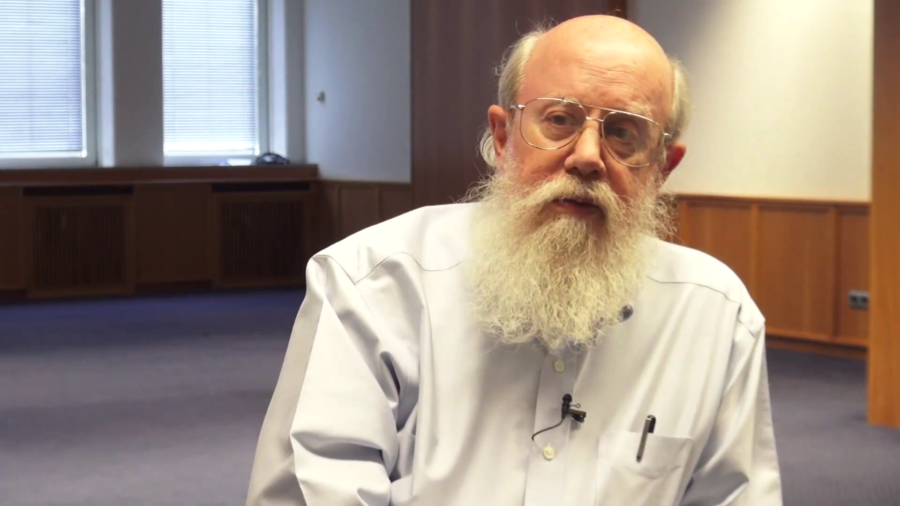Scott Bradner: I got my first email account on the ARPANET in 1972, and have had continuous email connectivity since then. In the mid-1980s, opened up the ARPANET and then later on the TCP/IP networks to the Harvard campus—I work at Harvard University. Put in the Harvard core campus network in that timeframe. I was the head of the technical committee for Harvard’s network, for a regional network in the New England area, and for the National Science Foundation associated regional networks around the country in the mid-90s. And then joined the Internet Engineering Task Force, 1990. Was appointed Area Director for Operational Requirements Area, 1993. I Stayed in that role for four years, then was appointed the Area Director for Transport Area and stayed in that role for six years. So, I was on the IESG, the standards approval body for the IETF from 1993 to 2003.
Intertitle: Describe one of the breakthrough moments or movements of the Internet in which you have been a key participant.
Somebody asked me a few years ago what was the biggest surprise. Being involved in the Internet from the very beginning, the real Internet started January 1, 1983 when the TCP/IP protocols were put out. And the Web started in ’93. So, back in the late 80s, in the middle 80s, I was using the net daily all the time. It was magic. You just did magic things and magic things happened. Email was all text-based.
The biggest surprise I’ve ever had about the Internet is that my mom surfed. It never occurred to me in the early 80s that my mother would ever knowingly use the Internet. It was a toy—it was a geek thing. It was for scientists, it was for researchers, it was for technical people. I expected her to use it without knowing it, because I expected it to be an underlayment for a lot of telecommunications. But I didn’t expect her to use it. The Web changed all of that. The Web made it so that normal people could use this thing. And that was my biggest surprise. That was the sort of eureka moment, when mom said, “I want to do this.”
Intertitle: Describe the state of the Internet today with a weather analogy and explain why.
Like the weather over any continent, it varies. There are thunderstorms in places, and there’s cool weather in others, and there’s significant turbulation other places. So, the weather over the United States in the last six months has been tremendously variable. One of the hottest summers on record in the Boston area, which is where I live, following a very cold winter. Lot of snow. Lot of rain. Very very heavy rain this spring. And that’s pretty much the way I think of what’s going on in the net.
We have very turbulent weather when it comes to governments being scared of the net, the Arab Spring kind of thing. And we have smooth sailing when it comes to technology. Technology is going very well. We have things like Skype and the like, which are incredibly powerful, very game-changing technologies. Netflix and all of those things that are running over. And those are great. Those are about as sunny as you can get. Sunny and clear as you can get. ‘Course if your business is being disrupted by the same technologies, you don’t think it’s sunny.
Intertitle: What are your greatest hopes and fears for the future of the Internet?
I think there’s a number of possibilities. One of the possibilities is that this becomes a Disney-controlled TiVo. That the content providers are right that all we want to do is watch couch potatoes watching movies. I don’t think that’s likely, but that’s certainly one scenario, and the copyright industry wants the Internet designed in such a way that’ll facilitate that.
Another scenario is all government control, like in China where you have to register to use it. You have to have basically a driver’s license to use it and you can’t talk outside of the country without being filtered. Can’t even talk inside the country without being filtered. That’s not just China, there’s many countries like that.
The ultimate one, the IETF model, would be the end-to-end model, which is where I get to decide what applications I’m going to run, and I talk to you about what applications we’re going to work together on. Dramatic new developments in technology and services and games, or whatever. And those are the primary three applicants.
I guess the fourth one is it’s completely run by carriers, where the telephone companies and the cable companies decide for you what you need, without bothering to ask you.
So it’s…some very negative views, which all but one of those is very negative. The very positive—the Pollyannaish one is the end-to-end model of the IETF.
Intertitle: Is there action that should be taken to ensure the best possible future?
It’s mostly education of governments. The Internet has brought brought phenomenal economic health to the countries that have embraced it, but has also brought huge social change to others that have embraced it. And telling countries that they benefit more than they are hurt by it, educating them why that’s the case, educating them that the open Internet, the open standards process, the open development, is beneficial to them and their citizens, is the primary vehicle to try and get a positive result.
